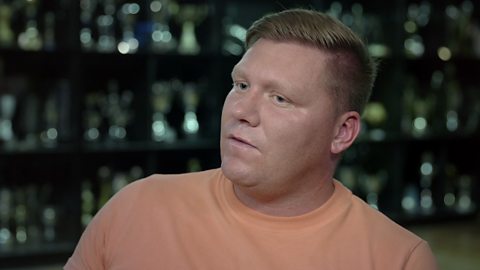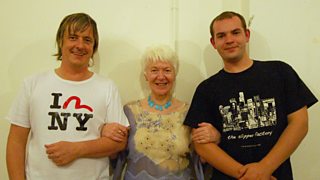Footballer's cautionary tale of a trail-blazing transfer gone wrong
Football brought Garry O’Connor wealth and success but the controversial player lost it all.
Hibernian striker, Garry O’Connor, made headlines in 2006 when he became the first British player to be signed by a Russian club.
Contract terms meant the 22-year-old was entitled to receive 15% of his £1.6 million transfer fee to Lokomotiv Moscow. Instead of pocketing the cash he donated it to Hibs' youth academy.
It was a generous gesture, however, as Playing the Game: Garry O'Connor reveals, the move would bring him more money than he ever could have imagined. But it wouldn't make him happy.

Russian rewards
Garry recalls the financial benefits of playing in Russia.
'No social life whatsoever'
In Moscow, Garry was earning around £16,000 per week, supplemented by eye-watering win bonuses. The money was easy to spend; he shelled out on designer clothes and expensive new wheels.
“The most I spent on one purchase was probably a Ferrari," admits Garry. "120 grand. In cash.”
While the financial rewards of playing for Lokomotiv Moscow were great, life in the Russian capital was harder to deal with. After training, Garry would return to his apartment with nothing to do for the rest of the day.
“There was no social life whatsoever," he remembers. "I was quite isolated."
Garry’s wife Lisa became homesick and returned to Scotland with their young son, Josh. She would eventually come back to Moscow every other month, alternating visits with Garry's mum so he wouldn’t be left alone.
Despite his family's efforts, isolated from friends and thousands of miles from home, Garry’s mental health suffered and he began showing signs of depression.
After a year abroad, and having helped Lokomotiv win 2007's Russian Cup Final, he returned to the UK to play for Birmingham City.
'I'm no angel'
Garry continued to play while hiding his depression and anxiety, though his career was marred by string of controversies.
He went AWOL when due to join a Scotland international ; failed a doping test at Birmingham City, and in 2012 he was sentenced to community service for possessing cocaine and obstructing police.
Now aged 37 and speaking openly about how his mental health has shaped his life, Garry hopes his story can act as a warning for young players starting out in their football careers.
“I’m no angel. I’ve made a few mistakes. I hold my hands up to them," he says.
Garry's fortune has now disappeared but he remains positive about the future.
"Life is what it is and you’ve got to move on with it."
On ÃÛÑ¿´«Ã½ iPlayer
-
![]()
Playing the Game: Garry O'Connor
Garry O'Connor talks candidly about mental health, money and drugs, giving a unique insight into the glitz, glamour and darkness behind professional football.
Latest features from ÃÛÑ¿´«Ã½ Scotland
-
![]()
'Wild swimming helps me process the grief of losing my son'
The benefits of cold water therapy.
-
![]()
Winter adventures are appealing, but an expert advises caution
Trips in winter require particular knowledge and skills.
-
![]()
The rescuers: Why volunteers risk their lives in mountain emergencies
Landward meets members of the Cairngorm Mountain Rescue Team.
-
![]()
‘Look for the light’ – practical tips to help you through another winter with SAD
Useful advice and tips to combat low moods at this time of year.
-
![]()
How you could be a binge drinker without even knowing
Binge drinking is classed as fewer units than many people may realise.
-
![]()
How chocolate biscuits and drama classes helped one man leave prison behind
The healing power of creativity.
-
![]()
'When people believe in you, it’s life-changing'
Author Graeme Armstrong revisits the man who helped turn his life around.
-
![]()
The 'breath-taking' display of US birds swept on to British soil
Recent storms have brought rare birds to our shores.
-
![]()
Six things we learned about Alan Cumming on Take the Floor (Spoiler: includes accordions)
The actor spoke to Take the Floor's Gary Innes.
-
![]()
How street gangs trap young men in a dangerous cycle of violence
The almost inescapable pull of life in a gang.
-
![]()
Why stylist Gok Wan believes there's no such thing as bad fashion
The fashion expert says we should stop following rules and do what feels right.
-
![]()
Is sending a CV still the right way to apply for a job?
They've been central to job applications for years, but are they worth it?
















